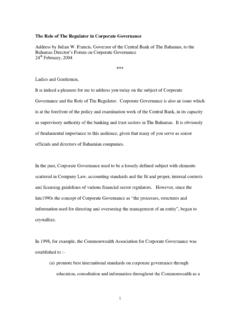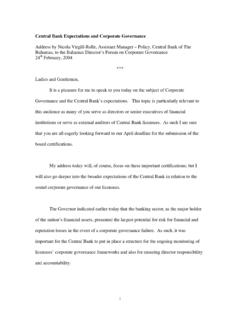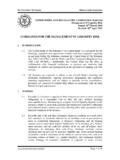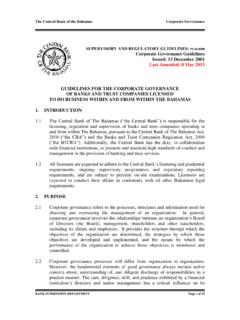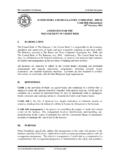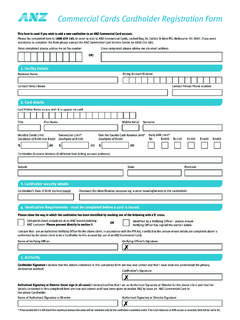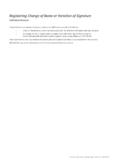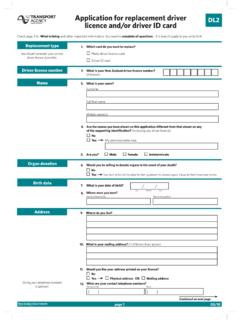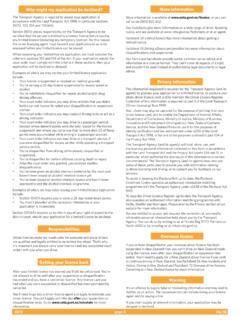Transcription of Proposed Annex to Central Bank AML/CFT …
1 Proposed Annex to Central Bank AML/CFT Guidelines: Guide to Account Opening, Provision of financial services and customer identification This guidance describes the acceptable methods of identifying individuals under the financial Transactions Reporting Act (FTRA) and associated Regulations. It applies to banks, trust companies, co-operative credit unions, money transfer businesses (MTBs), and payment service providers supervised by the Central Bank of The Bahamas. Collectively, they are referred to as Supervised financial Institutions (SFIs). These methods can be used to identify individuals (natural persons) who: seek to obtain payment services from any institution supervised by the Central Bank seek to open accounts on behalf of themselves;. would like to be signatories to an account; or are associated with a Bahamian business or other entity. This guidance also seeks to clarify which reliable, independent source documents, data or information can be used to verify a customer 's identity.
2 SFIs do not have to re-identify a client if they did so using the previous methods, kept the appropriate records, and have no doubts about the accuracy of information obtained. Identifying a client requires that the SFI view certain information to verify a client's identity, and ensure that the information is accurate and consistent with what is known about the client. Instead of relying on residential mailing address, SFIs must now maintain at least two means of contacting the customer . This will provide a more efficient and predictable means of managing the risk of fraud, money laundering, and other identified risks. When is identification not required? In accordance with the Payments Instruments (Oversight) Regulations, 2017, Payments Institutions may waive customer identification procedures when the Bahamian dollar payment instrument has a maximum stored limit of B$500, and is reloaded with up to B$300 per If at the time of issuance, a payment instrument immediately (or prospectively) falls outside of these parameters, it is subject to the guidelines below.
3 Process for Opening an Account or Provision of services Individuals can open an account as long as they meet certain conditions, and provide other critical information. This approach creates three categories of documents: A, B, and C. SFIs must complete three steps: Step 1: Choose a combination of ID documents from a menu of options in each category Step 2: Gather at least two means of contacting the customer 1. Under the regulations, a Payment Institution is defined as any Payment Service Provider other than a bank or trust company, credit union or MTB. 1|Page Step 3: Conduct a risk assessment of each customer (upon commencing the relationship, and on an ongoing basis using a risk-based approach). If the person's nationality and occupation are not captured on the pieces of ID presented during Step 1, it is acceptable for the customer to disclose that information orally or in writing. Step 1: The Categories Explained Category A documents are those issued by the Government of The Bahamas, an authorized statutory body in the Bahamas, or a foreign Government (as stipulated), that bear some combination of a name, photograph, signature, and date of birth.
4 Category B and C documents should be easily obtained by those living and working locally. Much more so than a recent utility bill, as is current practice. They are also generally less expensive to acquire (and renew) than Category A documents. All but one of the Category B. and C documents are generated or issued within The Bahamas. The Central Bank reserves the right to amend the categories as information sources evolve. Where an identification document is listed, its electronic successor should also be acceptable. For example, a document that is paper now may subsequently become a plastic card, or part of a searchable online database. Where indicated, only originals or certified copies are acceptable. A piece of identification is considered an original if the customer received or obtained it in hand, via mail, or electronically ( downloaded from a website). The document must appear valid and unmodified. Who is a Suitable Referee? A Category C suitable referee is a person who knows the customer and whom the SFI can rely on to confirm that the customer is who he or she claims to be.
5 A suitable referee can also verify other personal details about the customer . Any of the following may be a suitable referee: current or former employer with whom the SFI has an existing relationship school principal or guidance counselor licensed public accountant senior official at or above the rank of manager at any Central Bank SFI. employee of the financial institution at which the service is being requested senior civil servant, including law enforcement officer doctor of medicine elected official justice of the peace or notary public minister, priest, or other religious leader counsel and attorney-at-law any other individual that the Supervisory Authority (the Central Bank) may designate Any certification or statement provided by the referee must include the following minimum details: customer 's full name customer 's residential address customer 's occupation (or nature of self-employment). referee's name, address, occupation and contact details (such as phone number).
6 How long the referee has known the customer 2|Page a statement confirming that the referee believes the information provided about the customer to be true signature of the customer and referee with the date the document was signed Process to Open an Account or Access Other services The new method creates three categories of document: A, B, and C. To open a deposit account, become a signatory on a deposit account, or access a service provided by an SFI, the customer must present one of the following combinations of identification : 2 items from Category A;. 1 item from Category A and 1 item from Category B or C; or 1 item from Category B, and 1 item from Category A or C. Category A. A Certificate of Bahamian Citizenship A Certificate of Naturalization A current driver's licence issued in The Bahamas A current passport (from any jurisdiction). A card issued by the National Insurance Board (NIB), bearing a National Insurance Number A Permanent Residence permit A current work permit A Resident belonger permit A Spousal permit Category B.
7 An original or official copy of a birth certificate issued by the Government of The Bahamas An officially (apostille) certified original or copy of a birth certificate issued by a foreign jurisdiction Category C. An employee identification card bearing the individual's photograph, issued by an employer with whom the SFI has a relationship. A mortgage or other instrument of security (original or certified copy), bearing the individual's name and residential address. A letter issued by The Bahamas Ministry of Education, an accredited trade school, or institution of higher learning, confirming that the individual is (or was) a student. A Bahamas Government issued tax assessment or certificate bearing the individual's name and street address, post office box, or a description of their real property A voter's card issued by the Parliamentary Registration Department A Bahamas credit reference agency search (or a copy of the results). A written reference from a suitable referee (in the form specified by the Central Bank).
8 In general, there is a supervisory expectation that persons opening bank accounts in The Bahamas, or obtaining other financial services from SFIs have a material connection to the jurisdiction. This material connection is demonstrated when at least one of the items from Categories A, B, or C was issued by the Government of The Bahamas, an authorized statutory body, or generated domestically. 3|Page Where the information provided in one piece of ID does not match the information provided in another, additional information must be provided that explains the discrepancy. For example, reliable evidence of marriage, divorce, or adoption. Step 2: From Address Verification to Validation of Means of Contact . SFIs must maintain at least two current means of contacting each natural person customer , one of which must be a mailing address disclosed by the customer . The second may be any authenticable means of communicating with the customer electronically. The methods may include any combination of the following: Residential or Business Address Residential or personal mailing address Business mailing address In both instances, SFIs must gather the: street, post office box number (if any), city, state/province (if any), postal/zip code (if any), fixed line telephone contact (if any) and country.
9 Other Means of Contact Authenticable personal email address Authenticable business email address (if necessary). Authenticable mobile phone number Authenticable business mobile phone number (if necessary). Authenticable personal landline number Authenticable business landline number (if necessary). Other means of contact that the Central Bank might specify For communication with minors, SFIs may also rely on direct points of contact with the individual(s). authorised act to on their behalf, such as legal parents or guardians. There are some instances where customers may have may have multiple residences. In these cases, it is permissible to use more than one residential address with ( one address in New Providence and another in Eleuthera, Bahamas or Toronto, Canada). SFIs must develop flexible internal procedures to verify the accuracy of the contact information provided. For example, a suitable referee can confirm the customer 's address, much like the letters accepted under the previous standards.
10 SFIs should also develop internal procedures to authenticate electronic and other contact information. Items such as email addresses and mobile telephone numbers should be verified almost immediately. Step 3: Risk Assessment All customers must be assessed for risk upon commencing the relationship, and on an ongoing basis using a risk-based approach. Those customers deemed high risk will need to have their sources of funds and sources of wealth verified, and must produce at least one Category A document as part of their identification package. How to Identify Minors If a child is under 18 years old, the SFI must verify the ID of the parent or guardian and record the parent's or guardian's information. The SFI can also rely on the information about the child provided by the parent or guardian. Prospective customers aged eighteen and over must be able to meet the requirements independently. 4|Page Refusal to Open Account or Provide a Service There are several reasons why an SFI may refuse to open an account or provide a service and still comply with this guidance: If the SFI has reasonable grounds to believe that the facility would be used for illegal or fraudulent purposes.

